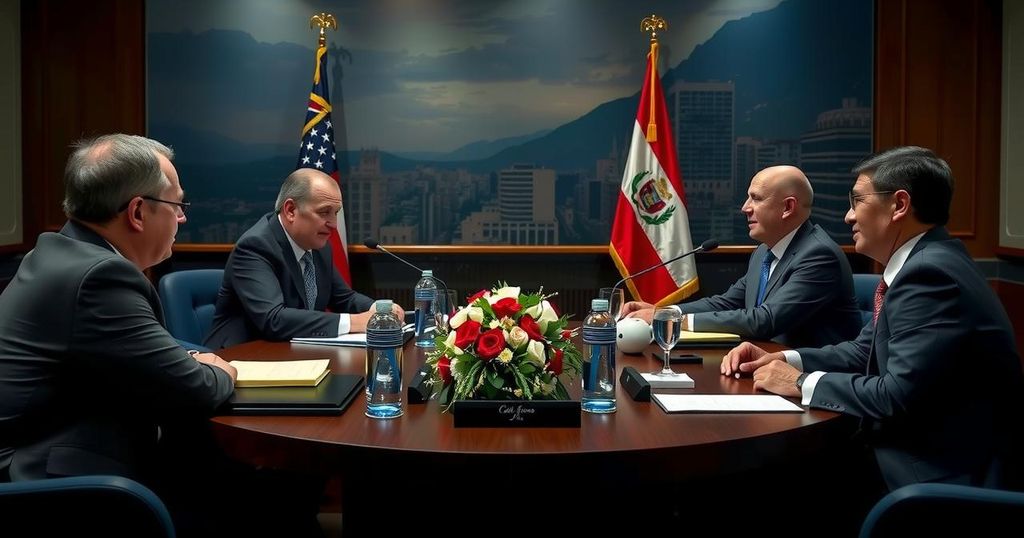Global news
ASIA, ASIA - PACIFIC ECONOMIC COOPERATION, BIDEN, BIDEN ADMINISTRATION, FOREIGN POLICY, GUAM, HAWAII, INTERNATIONAL RELATIONS, LAI CHING - TE, LIMA, LIN HSIN - I, NORTH AMERICA, OCEANIA, PERU, REUTERS, SOUTH AMERICA, SOUTH CHINA SEA DISPUTE, TAIWAN, TRADE RELATIONS, UNITED STATES, US-CHINA RELATIONS, WASHINGTON, XI
Marcus Li
0 Comments
Xi Jinping Commits to Cooperation with Trump Administration During APEC Meeting with Biden
At the APEC summit in Lima, Chinese President Xi Jinping pledged to collaborate with President-elect Donald Trump while meeting outgoing President Joe Biden. As both leaders discussed vital issues like trade and Taiwan, Xi stressed the importance of maintaining a stable U.S.-China relationship despite challenges, with Trump planning aggressive trade policies that may strain ties further. The meeting signifies the uncertain dynamics as Trump prepares to take office amidst various geopolitical tensions.
During a meeting on Saturday, November 16, in Lima, Peru, Chinese President Xi Jinping expressed his commitment to collaborate with the incoming administration of President-elect Donald Trump. This meeting marked Xi’s concluding discussions with outgoing President Joe Biden at the Asia-Pacific Economic Cooperation (APEC) conference. Xi underscored that China’s ambition for a stable and sustainable relationship with the United States remains unchanged despite the forthcoming changes in U.S. leadership. Both leaders acknowledged the complexities of their respective nations’ relations, particularly concerning trade, cybercrime, Taiwan, and Russia. Despite a history of differing viewpoints, Biden acknowledged that their discussions have been characterized by frankness. The timing of these talks is notable, occurring just two months prior to Trump’s inauguration, during which he has signaled intentions to impose significant tariffs on Chinese imports. Additionally, Trump’s prospective administration appears poised to appoint individuals with confrontational stances towards China, which may further complicate bilateral relations. Biden has expressed a desire to stabilize relations amidst rising tensions over cybersecurity breaches linked to China and an increasingly assertive stance regarding Taiwan. Taiwan’s leaders have soon planned sensitive visits that could provoke reactions from Beijing. Despite these strains, Biden is also seeking China’s assistance concerning North Korea. The economic impact of Biden’s policies on China, particularly restrictions on investment and trade, is significant. The two countries face the risk of further deterioration in their relationship if adversarial competition prevails over camaraderie. Xi emphasized that, “When the two countries treat each other as partner and friend, seek common ground while shelving differences, and help each other succeed, our relationship would make considerable progress,” advocating for cooperation instead of competition. As Pacific Rim leaders consider the implications of Trump’s impending presidency, Xi’s concurrent diplomatic endeavors in Latin America underscore China’s broader strategic ambitions in the region. He aims to strengthen economic ties by embracing new trade agreements and enhancing infrastructure projects while countering perceived encroachments by China in U.S. spheres of influence. Amidst the challenges of declining Chinese investment abroad, experts believe Xi will receive a warm welcome, indicating a possible recalibration of regional dynamics as U.S.-China relations remain fraught. The meeting between Xi and Biden serves as a crucial indicator of the challenges the U.S. faces in maintaining its influence in Latin America while navigating its complex relationship with China, particularly in view of Trump’s forthcoming leadership.
The meeting between President Xi Jinping and President Joe Biden, set against the backdrop of the APEC conference, is pivotal in understanding the future trajectory of U.S.-China relations. With the upcoming transition in U.S. leadership, Xi emphasized China’s enduring desire for a stable partnership, even in the face of rising tensions over various contentious issues, including trade and Taiwan. This meeting also highlights the strategic competition so characteristic of U.S.-China relations, and the need for diplomatic engagement in navigating these complex issues. Analysts suggest that the approach taken by the Trump administration will significantly influence future bilateral dynamics, particularly with its proposed economic policies.
In summary, Xi Jinping’s reaffirmation to engage constructively with the incoming Trump administration reflects China’s strategic intent to manage its relationship with the United States’s evolving leadership. The discussions at the APEC summit underscore the complexities and potential flashpoints in U.S.-China relations, particularly concerning trade, cybersecurity, and regional stability, particularly regarding Taiwan. Biden’s candid acknowledgment of their differing perspectives, alongside Xi’s push for cooperation, suggests an acknowledgment of the necessity of ongoing dialogue to prevent escalating tensions and foster a stable bilateral relationship moving forward.
Original Source: www.channelnewsasia.com




Post Comment